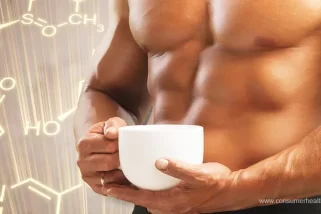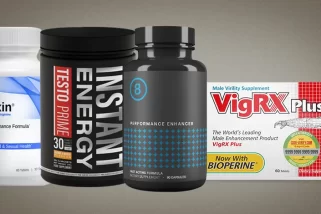In This Article
Overview
We hear the word testosterone a lot, especially in discussions where people talk about men with large muscles, men who are confident, and men who are good in bed. Society makes a strong connection between high levels of testosterone and the “alpha male,” a term that refers to all features associated with masculinity. This association is certainly not faulty, as testosterone plays a part in everything that makes a man… a man.
The problem, however, is that testosterone gradually reduces in small amounts when a man reaches a certain age. In some men, this reduction in testosterone production is sometimes more rapid than in other men, which may cause such a man to experience a variety of symptoms, often called “testosterone deficiency symptoms.”
Improving levels of testosterone in the bloodstream is possible, even for a person who finds that their testosterone levels are depleting at a rapid rate.
It is already known that conventional treatment options exist for men who suffer from low testosterone, but there are many risk factors to consider when opting for these methods of restoring testosterone levels.
The risks often make men opt for alternative choices, which is where testosterone booster supplements come in, but a lot of men do not realize that these supplements also come with their own set of potential risk factors.
In this guide, we are going to discuss why testosterone is so important for a man’s overall performance, what symptoms may signal a testosterone deficiency, how low levels of testosterone may occur, as well as take a look at both conventional and natural treatment options for testosterone.
We will also discuss the potential testosterone booster supplement side effects, and consider what other methods men can utilise to help their bodies produce more testosterone.
Why is Testosterone Important for Male Performance?
First, we should mention that testosterone is a sex hormone. It is actually the main sex hormone that is produced in the male body and is also present in the female body, but in very small amounts as compared to its concentration within the male body.
Medical News Today [1] explains that testosterone plays a significant number of roles in the male body. As one would expect, testosterone has an effect on how a man performs in the bedroom, which can be derived from the fact that this is a sex hormone.
It should, however, be noted that testosterone does not directly affect a man’s ability to have an erection, but rather affects his sexual performance through the regulation of a healthy libido and by maintaining his fertility.
While classified as a sex hormone in the male body, testosterone also plays other roles that are very important for the maintenance of a man’s overall physical and mental health.
In addition to regulating a man’s sex drive and contributing to his fertility, Testosterone is also known to maintain a healthy bone mass, assist with proper fat distribution, provide men with physical strength, and allow them to build more muscle mass. Additionally, testosterone has a role to play in the production of red blood cells.
What are the Symptoms of Low Testosterone in Men?
The most common symptom that a low testosterone count in a man’s body causes is usually considered to be a low sexual drive. Fertility may also become a problem among men who suffer from low testosterone levels, but there are some other symptoms that may not be obvious.
For this reason, men should be aware of what additional symptoms they may experience when their testosterone levels become too low. This can help a man determine whether he is suffering from a testosterone deficiency or if his symptoms are caused by another factor.
MedicineNet[2] explains that even though testosterone is known not to directly affect a man’s overall sexual function, apart from causing them to experience a reduction in their sex drive, a lot of men with testosterone deficiency tend to experience other types of sexual dysfunction as well, such as erectile dysfunction.
Furthermore, emotional changes and the development of symptoms associated with depression is also relatively common. Due to testosterone’s contribution to fat distribution, weight gain is also not uncommon among men with this problem. Other symptoms may include changes in their sleep quality and patterns, as well as a reduction in their physical strength.
Why Do Men Suffer from Low Testosterone Levels?
It should be noted that testosterone starts to decline gradually when a man reaches a certain age, which is usually between 25 and 30. The gradual decrease in testosterone production is relatively subtle, which means a man should not experience any significant problems due to this gradual decline.
In some men, however, levels of testosterone can start to decrease at a much more rapid rate; thus causing their testosterone levels to become lower than what is considered normal for a man of their particular age.
There are various potential causes for a low testosterone level in men, and these causes account for men of all ages. WebMD explains that some of the most common causes of a testosterone deficiency in the male body include:
- Hormonal disorders.
- Infection of the testicles.
- Being infected with the HIV/AIDS virus.
- Type 2 diabetes.
- Being overweight or obese.
- Suffering an injury directly to the testicles.
- Chronic liver disease.
- Chronic kidney disease.
- Testicular cancer.
- Certain treatment options administered for testicular cancer.
It is important to realize that there are other risk factors that might make a man more likely to experience a significant reduction in his testosterone levels as well.
When a man lives a sedentary lifestyle and does not consume a healthy and balanced diet, he is more likely to suffer from chronic diseases and also become obese. In turn, these may affect his testosterone levels as well.
What are the Conventional Ways to Treat Testosterone Deficiency in Men?

Testosterone Booster Side Effects on Males
When a man obtains a physical examination from a doctor after complaining about symptoms related to testosterone deficiency, the doctor is likely to order some tests to be conducted.
These tests will help the doctor determine the man’s current testosterone levels in his bloodstream, as well as rule out any other potential causes for the particular symptoms the man may be experiencing.
Should the healthcare provider find that the man’s testosterone levels are not in a range that can be considered normal, then they will offer the man the option to undergo a treatment known as testosterone replacement therapy, often also simply called testosterone therapy.[3]
Mayo Clinic explains that testosterone therapy is often viewed as an anti-aging treatment by men who are feeling the effects of their age setting in. This is due to the fact that testosterone is responsible for many features that can be observed in younger men – muscle mass, physical strength, a lean body, a healthy sex drive, and more.
Unfortunately, however, men often fail to recognise the fact that there are also several potential risks and consequences that may come with the utilisation of testosterone therapy. Through the use of testosterone therapy, the body is supplemented with a synthetic type of testosterone that is produced in a laboratory.
For this reason, it is important not to expect this type of testosterone to mimic the exact potency and effectiveness of natural testosterone produced by the male body. It should also be noted that studies are still relatively unclear about how well testosterone therapy actually helps.
Many studies find that testosterone therapy is useful for some symptoms a man may experience when suffering from low testosterone, but will most likely not contribute to improvements in all of the symptoms they are suffering from.
Testosterone Boosters and Male Testosterone Levels Men who have realised the potential risks that come with the use of testosterone therapy are constantly on the lookout for an alternative way they can regain healthy levels of this essential hormone in their bodies without exposing themselves to the potential risks that come with testosterone therapy.
Testosterone Boosters and Male Testosterone Levels Men who have realised the risks associated with testosterone therapy are constantly looking for an alternative way to regain healthy levels of this essential hormone in their bodies without exposing themselves to the risks associated with testosterone therapy.[4]
minerals and vitamins, as well as natural plant extracts, to help the body make more testosterone.
Thousands of such testosterone boosting supplements have been released on the market, and millions of men have turned to these products to help them potentially grow stronger, build more muscle mass, get better in the bedroom, and improve other parts of their lives that have been affected by their low testosterone levels.
While little research exists that suggests these natural compounds do indeed cause testosterone levels in the male body to become elevated, the benefits that they may offer, such as increased physical strength and improvements in muscle mass, might contribute to an effective strategy to counteract the symptoms of low testosterone and potentially also help increase testosterone production in an indirect way.
Unfortunately, similar to testosterone therapy, these natural testosterone boosters are not without risks. While they may not cause similar side-effects as testosterone therapy is known to cause, there are some potential side-effects and risks that men should take into consideration before they start using such a product.
The most common type of side-effect that men tend to experience when they start using a natural testosterone supplement is usually a reaction on their skin. This often includes their skin becoming prone to developing acne, as well as excessively oily.
The skin on the back of a man’s body is often mostly affected by these symptoms. Other potential side-effects that may also be experienced when opting for a natural testosterone booster include:
- Sleeping problems, such as sleep apnea and insomnia.
- Rapid muscle gain may become problematic when there is not enough time for supportive tendons and ligaments to grow.
- Prolonged use of some supplements has caused kidney problems in some men.
- Some men have also experienced quick-temper, an aggressive behavior as well as quickly becoming angry at irrelevant topics.
- Mood swings are also not uncommon amongst men who take these supplements, especially those taking large doses over a long period of time.
- PSA levels may become elevated, which may signal prostate cancer, as well as prostate gland inflammation.
Even though these potential side-effects may be concerning, it is important that men realize they can use natural testosterone supplements like Libido Max without experiencing any significant side-effects.
The key is to take these supplements in moderation, not overdo themselves at the gym, and ensure they take care of themselves. Eat a healthy, balanced diet and the supplement purchased should be analyzed first. There are hundreds of websites on the internet that provides accurate reviews from past users on these types of supplements.

Can Taking Testosterone Supplements Be Harmful?
Final Verdict : Should You Buy Testosterone Boosters?
While testosterone is a vital hormone in the male body, contributing to a man’s overall performance – on the field, in the bedroom, at work, and through his day-to-day activities – it is important to note that experiencing the symptoms of low testosterone does not guarantee you are suffering from this condition.
Before grabbing the first supplement at your local supplement store that promises to boost your testosterone levels, first visit your doctor and see if you do need a boost in testosterone. Instead of opting for testosterone replacement therapy or popping a potentially sketchy supplement every day, you may want to consider rather opting for alternative methods to improve the level of testosterone produced in your body.
There are, however, some testosterone boosters like Hard-On Helper that may help to improve physical strength, muscle growth, and sexual well-being without causing any harm to your body, but should you wish to opt for such a supplement, do your research before simply buying a generic product that may contain ingredients that could lead to a number of unpleasant side-effects.
We have provided a complete overview of testosterone’s function in male performance, conventional methods to treat a testosterone deficiency, and the possible side-effects that could occur when using a natural supplement that claims to improve testosterone in this article.
The next time you plan on buying such a supplement, take the tips and suggestions made in this article to mind and consider trying some of the alternative remedies first.
4 Sources
We review published medical research in respected scientific journals to arrive at our conclusions about a product or health topic. This ensures the highest standard of scientific accuracy.
[2] Low testosterone : https://www.medicinenet.com/low_testosterone_low_t/article.htm
[3] Testosterone replacement therapy : https://pubmed.ncbi.nlm.nih.gov/32068334/
[4] Risks of testosterone replacement therapy : https://www.ncbi.nlm.nih.gov/pmc/articles/PMC3897047/
**This is a subjective assessment based on the strength of the available information and our estimation of efficacy.
*Result may vary. If you have a serious medical condition, or have a history of heart conditions we suggest consulting with a physician before using any supplement. The information contained in this website is provided for general informational purpose only. It is not intended to diagnose, treat, cure or prevent any disease and should not be relied upon as a medical advice. Always consult your doctor before using any supplements.
Disclosure of Material connection: Some of the links in the post above are "associate sales links." This means if you can click on the link and purchase an item, we will receive a commission. Regardless, we only recommend products or services which we use personally and/or believe will add value to our readers. We are disclosing this in accordance with the Federal Trade Commission's 16 CFR, Part 255: "Guides Concerning the Use of Endorsements and Testimonials."










 This article changed my life!
This article changed my life! This article was informative.
This article was informative. I have a medical question.
I have a medical question.
 This article contains incorrect information.
This article contains incorrect information. This article doesn’t have the information I’m looking for.
This article doesn’t have the information I’m looking for.